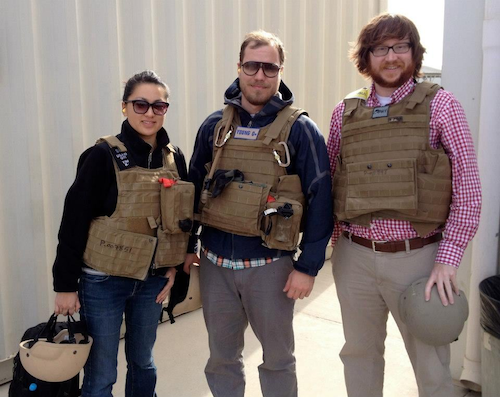
USC Marshall School of Business Launches Asia Executive Advisory Board to Strengthen Global Partnerships
Distinguished leaders gather from across Asia to guide strategic expansion and deepen regional engagement.
Working to Keep America’s Promise

When America pulled out of Afghanistan after more than 20 years this fall, the world watched evacuation proceedings with horror. But for Sara Yim it was personal.
After more than a decade working in high-conflict areas as a United States Agency for International Development (USAID) official, Yim knew many Afghan families who worked with the United States who were now in grave danger.
“I think we made the assumption that Afghan ground forces would hold—and that was a bad assumption,” she said.
Yim is currently a student at USC Marshall’s Master of Science in Social Entrepreneurship (MSSE), but she’s not exactly taking a hiatus. As evacuations unfolded, she got in contact with former colleagues in her field to try and mitigate the unfolding disaster.
“We somehow ended up launching a non-profit initiative,” she said.
Transit Initiatives is a women-led non-profit seeking to evacuate and resettle Afghans, in particular civil society partners of the US government and at-risk groups, including journalists and members of the LGBTQ+ community.
Yim was on the ground for USAID for nearly 15 years, working in some of the most dangerous areas in the world, including Somalia, Syria, South Sudan, and Afghanistan. She learned the realpolitick necessary to do her work.
But she increasingly became convinced that the only way to deal with an increase in humanitarian crises, including the influx of refugees and internal displaced persons (IDP) situations is to find a way to create private/public partnerships.
“I see what’s coming down the pike,” she said, referring to increasing refugee emergencies fueled by climate change and growing political instability. “The problems are too big for governments alone to manage. And I want to be part of that conversation."
“The problem sets in the world will require private sector dollars and private sector innovation, combined with government spending and donor gifts. There are a lot of complex problems, and we need to unite our efforts in order to maximize our impact.”—Sara Yim, former USAID official, MSSE '21
A pain point is risk. American companies are wary of taking a risk with investing in unstable countries. “In order for more private sector involvement in countries adversely affected by migration challenges, more U.S. Government policies need to incentivize risk-taking of American companies,” she said.
Coming Home
After years abroad and in Washington, Yim decided she needed to recalibrate. She moved home to Los Angeles, where she grew up, and decided to pursue a business education. She specifically wanted to focus on how to blend business with social good. Marshall’s MSSE degree fit the bill. And her unique background has already inspired her classmates.
“I didn’t do the traditional route of going to graduate school in my late ‘20s or early ‘30s,” she said. “I was already in the field I wanted to be in.”
Last summer she put her background and newfound skills to use for a Viterbi School of Engineering startup looking to help refugees via digital health. “Startups for government and companies aren’t dissimilar,” she said. “The basic principles are the same. Is your mission clear? Do you have the right people? How do you market this? The difference, though, is impact.”
She was able to apply her professional humanitarian aid knowledge to improve the efficacy of the app.
“The problem sets in the world will require private sector dollars and private sector innovation, combined with government spending and donor gifts. There are a lot of complex problems, and we need to unite our efforts in order to maximize our impact.”
RELATED
USC Marshall School of Business Launches Asia Executive Advisory Board to Strengthen Global Partnerships
Distinguished leaders gather from across Asia to guide strategic expansion and deepen regional engagement.
Quoted: Michael Mische in Christian Science Monitor
Mische explains how California has a growing dependency on foreign oil imports.
Quoted: Richard Green in CNN
Green explains that the government’s proposed 50-year mortgage may lower monthly payments, but the difference wouldn’t be enough to offset rising interest rates, ultimately costing families more.
Dean’s Dialogue: SpaceX CFO Bret Johnsen on Space Innovation and the Trojan Network
Bret Johnsen, a Leventhal alumnus, spoke with Marshall Dean Geoffrey Garrett about SpaceX’s cutting-edge projects, U.S. manufacturing, and the value of a USC education.